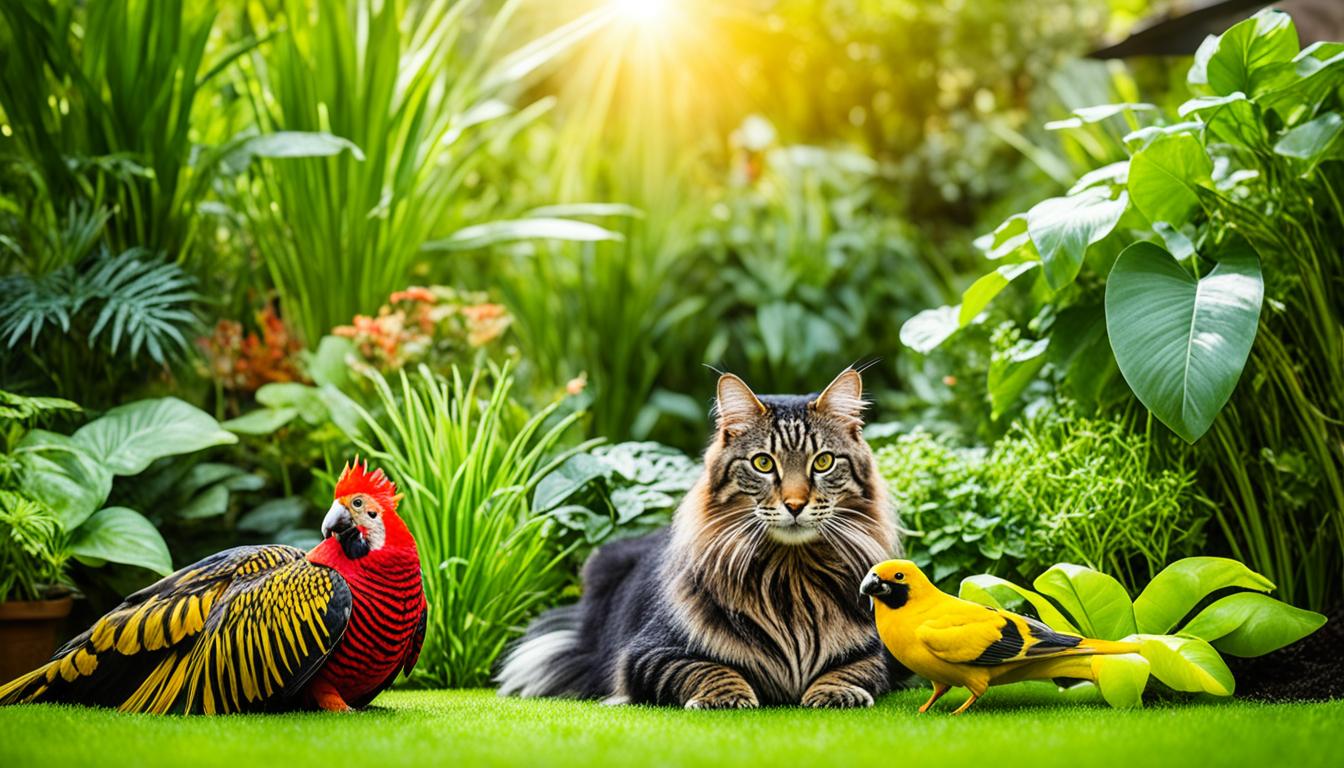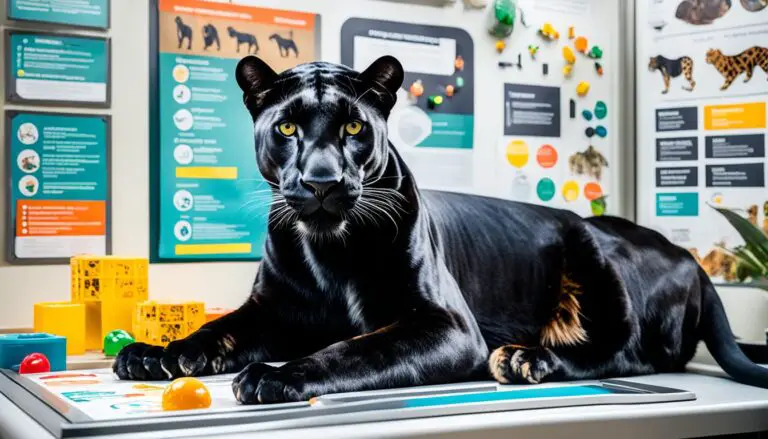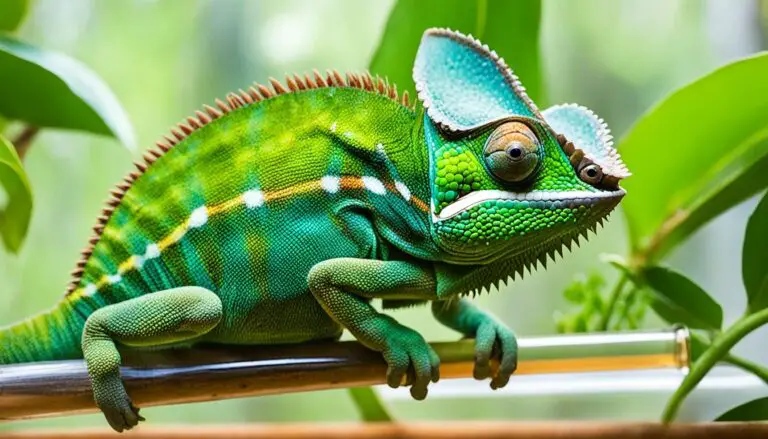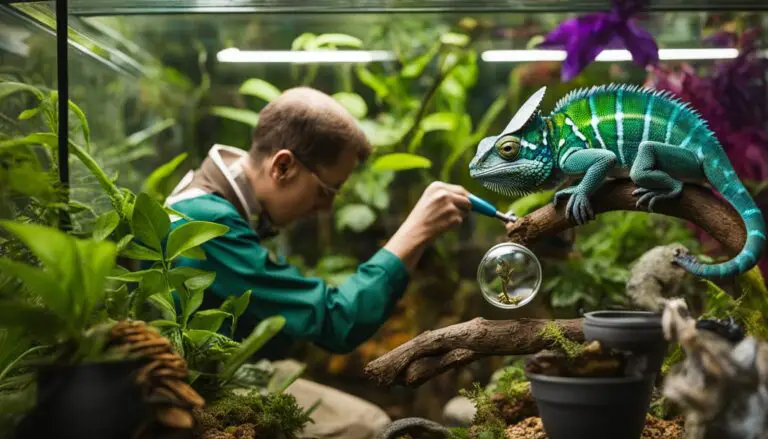Exotic Pet Care for Outdoor Pets: Best Tips
Caring for exotic pets is a rewarding experience, but it comes with its own set of challenges, especially when they live outdoors. From ensuring their health and safety to providing proper nutrition and creating suitable habitats, taking care of outdoor exotic pets requires special attention and knowledge. In this comprehensive guide, we will provide you with the best tips and advice to help you navigate the unique needs of your outdoor exotic pet.
Key Takeaways:
- Outdoor exotic pets require specialized care to thrive in their natural environment.
- Proper nutrition is crucial for the health and longevity of your pet.
- Creating a safe and comfortable outdoor habitat is essential.
- Regular veterinary care and monitoring play a vital role in preventing and treating illnesses.
- Mental stimulation and social interaction are key to promoting your pet’s overall well-being.
Understanding Exotic Pet Care for Outdoor Environments
When it comes to caring for outdoor exotic pets, understanding their unique needs is key. From the types of exotic outdoor pets to the challenges they may face, there are several factors to consider. Additionally, recognizing the signs of stress and illness in exotic pets is crucial for their overall well-being. In this section, we will explore these aspects in detail to help you provide the best care for your outdoor exotic pet.
Definition and Types of Exotic Outdoor Pets
Exotic pets encompass a wide range of species that are not typically kept as domesticated companions. When it comes to outdoor environments, some common types of exotic pets include rodents, rabbits, ferrets, reptiles, amphibians, and birds. These fascinating creatures require specialized care to thrive in an outdoor setting.
Common Challenges in Outdoor Exotic Pet Care
Caring for exotic pets in outdoor environments presents unique challenges. Outdoor factors such as temperature fluctuations, exposure to predators, and maintaining appropriate housing can pose obstacles to their well-being. Understanding and mitigating these challenges is essential to ensure the health and safety of your exotic pet.
Recognizing the Signs of Stress and Illness
Exotic pets may exhibit subtle signs of stress or illness that require keen observation. Recognizing these signs early can help prevent further complications and allow for timely intervention. Common indicators may include changes in appetite, behavior, appearance, or unusual discharge. Regular monitoring and understanding the normal behavior and appearance of your pet are vital to identify potential health issues.
Navigating the Essentials of Outdoor Pet Habitats
Creating a suitable outdoor habitat is crucial to the health and safety of your exotic pet. By providing a secure and comfortable environment, you can ensure that your pet thrives in their outdoor setting. In this section, we will discuss the essential aspects of outdoor pet habitats that you need to consider.
Location
The location of your outdoor pet habitat is an important factor to consider. Choose a spot that offers a balance of sunlight and shade, ensuring that your pet can regulate their body temperature effectively. Additionally, consider the proximity to your home for easy access and supervision.
Safety Measures
To prevent escapes and injuries, implementing safety measures is essential. Ensure that the habitat is escape-proof by using appropriate enclosures, such as fences, nets, or screens. Remove any toxic plants or substances from the surroundings, and secure the area to prevent access by predators or other animals.
Climate Control
Regulating temperature and humidity is crucial for your pet’s well-being. Provide shelters or shaded areas to protect your pet from extreme heat or cold. Consider using temperature-controlled enclosures or adding heat lamps or cooling devices if necessary. Monitor and adjust the humidity levels as per the requirements of your specific pet species.
Bedding Options
Choosing the right bedding is important for your pet’s comfort and hygiene. Consider using natural substrates such as wood shavings, shredded paper, or grass for burrowing animals. For reptiles, provide suitable substrates that cater to their behavioral and moisture retention needs.
Hygiene Practices
Maintaining good hygiene practices is essential to prevent the buildup of bacteria and parasites. Regularly clean the habitat, removing waste and soiled bedding. Provide fresh water and food in clean containers, and regularly disinfect the habitat to ensure a healthy living environment for your pet.
Access to Essential Resources
Ensure that your pet has easy access to essential resources within their habitat. Place food and water dishes in accessible locations, providing a variety of nutritious diet options suitable for your pet’s species. Include hiding spots, perches, climbing structures, and toys to promote physical and mental stimulation.
By navigating the essentials of outdoor pet habitats, you can create a safe and comfortable environment for your exotic pet. It is important to understand and fulfill the habitat requirements specific to your pet species to ensure their overall well-being.

Diet and Nutrition for Exotic Outdoor Pets
Proper diet and nutrition are crucial for the health and longevity of your exotic outdoor pet. To ensure your pet’s well-being, it is essential to understand their species-specific dietary requirements, avoid common nutritional pitfalls, and consult with veterinarians for personalized diet plans.
Species-Specific Dietary Requirements
Every exotic pet has unique dietary needs based on their species. Whether your pet is a herbivore, omnivore, or carnivore, it’s important to provide them with a diet that meets their nutritional requirements. Different pets may have varying proportions of protein, carbohydrates, and fats in their diet, as well as specific vitamins and minerals they need to thrive. Research your pet’s species-specific requirements and consult with a veterinarian to determine the appropriate diet.
Avoiding Common Nutritional Pitfalls
When it comes to feeding your exotic outdoor pet, it’s crucial to avoid common nutritional pitfalls. Many commercially available diets may not adequately meet your pet’s nutritional needs or may be inappropriate for their species. Additionally, excessive intake of vegetables and fruits can lead to imbalances in their diet. It’s important to provide a well-rounded and balanced diet that includes the right nutrients in appropriate amounts. Consult with a veterinarian to avoid these common pitfalls and ensure your pet’s diet is optimal.
Consulting with Veterinarians for Diet Plans
The guidance of a veterinarian is invaluable when creating a diet plan for your exotic outdoor pet. They can assess your pet’s specific needs, consider any underlying health conditions, and tailor a diet plan accordingly. Veterinarians have extensive knowledge of exotic pet nutrition and can provide recommendations on suitable food brands, portion sizes, and feeding schedules. Regular consultations with a veterinarian will help you ensure your pet’s diet is on track and contribute to their overall health and well-being.
| Species | Dietary Requirements |
|---|---|
| Herbivores | A diet mainly consisting of fresh vegetables, hay, and limited fruits. Some species may require specific types of grasses or browse. |
| Omnivores | A balanced diet that includes both animal-based proteins, such as insects or small mammals, and plant-based foods, like fruits and vegetables. |
| Carnivores | A diet primarily comprising animal proteins, including whole prey, fish, or high-quality commercial carnivore diets. |
Exotic Pet Care for Outdoor Pets: Proper Handling and Interaction
Proper handling and interaction with your outdoor exotic pet are essential for their physical and emotional well-being. By following safe handling techniques and training your pet for compliance and safety, you can minimize stress and build a strong bond with them.
Techniques for Safe Handling
When it comes to handling your exotic pet, it’s important to use gentle and secure techniques. Whether you need to capture, lift, carry, or perform basic husbandry tasks, here are some tips to ensure safe handling:
- Approach your pet calmly and confidently, avoiding sudden movements that may startle them.
- Use appropriate equipment, such as gloves or protective gear, if necessary.
- Support your pet’s body properly, especially if they have delicate or fragile limbs.
- Avoid excessive restraint or tight grips, as it can cause discomfort and stress.
- Always follow the specific handling instructions for your pet’s species to prevent injury.
Training for Compliance and Safety
Training your pet for compliance and safety is an integral part of their care. By implementing consistent and positive reinforcement techniques, you can establish clear boundaries and minimize the risk of accidents. Here are some key tips for training your outdoor exotic pet:
- Start with basic commands, such as “sit”, “stay”, or “come”, using rewards like treats or praise to reinforce positive behavior.
- Gradually introduce more advanced training exercises that are relevant to your pet’s specific needs, such as recall training or target training.
- Be patient and consistent in your training sessions, keeping them short and frequent to maintain engagement.
- Use positive reinforcement techniques that focus on reward-based learning instead of punishment.
- Work with a professional trainer or behaviorist for guidance and support, especially if you encounter specific challenges or issues.
Minimizing Stress Through Proper Interaction
Proper interaction with your outdoor exotic pet plays a significant role in minimizing stress and promoting a positive bond. Here are essential guidelines to ensure stress-free interactions:
- Observe your pet’s body language to understand their comfort level and adjust your interactions accordingly.
- Create a calm and predictable environment, free from loud noises or sudden disturbances that may startle your pet.
- Offer appropriate enrichment activities, toys, and socialization opportunities to keep your pet stimulated and engaged.
- Build trust and familiarity by spending quality time with your pet, engaging in activities they enjoy.
- Respect your pet’s personal space and boundaries, allowing them to initiate interactions on their terms.
By implementing proper handling techniques, training your pet for compliance and safety, and minimizing stress through proper interaction, you can ensure the well-being and happiness of your outdoor exotic pet.
Preventative Health Measures for Exotic Pets Outdoors
Preventative health measures are essential for maintaining the well-being of your outdoor exotic pet and preventing common health issues. By implementing these measures, you can proactively protect your pet’s health and minimize the risk of illness or disease.
To ensure the optimal health of your outdoor exotic pet, it is crucial to:
- Maintain proper hygiene: Regularly clean and disinfect your pet’s habitat to prevent the buildup of bacteria or parasites. This includes cleaning food and water dishes, litter boxes, and bedding.
- Perform regular health monitoring: Keep a close eye on your pet’s behavior and physical condition. Regularly check for any changes in appetite, weight, skin condition, or activity level that may indicate a health issue.
- Prevent parasite infestations: Consult with your veterinarian about appropriate parasite prevention measures for your particular pet. This may include regular flea and tick treatments, deworming, and heartworm prevention.
- Follow vaccination protocols: Ensure your outdoor exotic pet receives all necessary vaccinations as recommended by your veterinarian. Vaccinations can protect your pet from a wide range of diseases.
- Maintain environmental cleanliness: Keep your pet’s habitat clean and free from clutter. Regularly remove waste and make sure the living environment is safe and comfortable.
By adhering to these preventative health measures, you can give your outdoor exotic pet the best chance at a healthy and happy life. Regular veterinary check-ups are also vital for addressing any potential issues early on and ensuring your pet’s ongoing well-being.
Promoting Mental Health and Enrichment for Outdoor Exotic Pets
Mental health and enrichment activities play a crucial role in ensuring the overall well-being of your outdoor exotic pet. By providing opportunities for stimulation, social interaction, and a stimulating environment, you can enhance their mental and emotional health. In this section, we will explore various strategies and techniques to promote mental well-being and enrichment for your outdoor exotic pets.
Enrichment Activities and Toys
Enrichment activities and toys are valuable tools to keep your outdoor exotic pets mentally engaged and prevent boredom. They mimic natural behaviors and provide mental stimulation, promoting a healthier and happier pet. Consider providing puzzle feeders, foraging toys, or interactive play areas to engage your pet’s natural instincts and keep them mentally stimulated.

Social Interaction for Emotional Well-being
Social interaction is essential for the emotional well-being of outdoor exotic pets. Spending quality time with your pet, providing opportunities for bonding, and allowing them to interact with other compatible pets can significantly improve their overall happiness. Whether it’s through playtime, training sessions, or simply being present and affectionate, social interaction plays a vital role in promoting emotional well-being.
Environmental Stimulation and Its Importance
Creating an environment that mimics a natural habitat is crucial for the mental health and well-being of outdoor exotic pets. Providing various environmental stimuli, such as hiding spots, perches, climbing structures, and natural elements like rocks and branches, can promote exploration and prevent boredom. Additionally, incorporating sensory experiences, such as different textures and scents, can further enhance environmental stimulation and enrich your pet’s surroundings.
Enrichment Activities for Outdoor Exotic Pets
| Activity Type | Description |
|---|---|
| Puzzle Feeders | Challenging feeding devices that require problem-solving skills and mental stimulation. |
| Foraging Toys | Toys that allow pets to search for hidden treats or food, stimulating their natural foraging instincts. |
| Interactive Play Areas | Customized play spaces that encourage physical activity and mental engagement through obstacle courses, tunnels, and climbing structures. |
| Socialization Time | Dedicated time for your pet to interact with compatible animals or humans to foster social bonds and emotional well-being. |
| Natural Elements | Incorporating rocks, branches, and vegetation to create a more natural environment for exploration and stimulation. |
By providing enrichment activities, encouraging social interaction, and creating an engaging environment, you can promote the mental health and well-being of your outdoor exotic pets. Remember to tailor the activities to your pet’s specific needs and preferences, offering a range of options to keep them mentally stimulated and fulfilled.
The Role of Veterinary Care in Outdoor Exotic Pet Health
Veterinary care is essential in ensuring the health and well-being of your outdoor exotic pet. Regular veterinary check-ups and health monitoring are vital for preventing and detecting any potential issues early on. By prioritizing veterinary care, you can take proactive measures to keep your pet healthy and address any health concerns promptly.
During regular veterinary check-ups, the veterinarian will perform a thorough examination of your pet, paying close attention to their overall health, body condition, and specific needs based on their species. These check-ups allow the veterinarian to assess your pet’s growth, detect any signs of illness or disease, and provide guidance on proper nutrition and environmental management.
In addition to regular check-ups, it’s crucial to consult a veterinarian experienced in exotic pet care for any emergency situations. Accidents, injuries, or sudden health issues can occur, and having access to emergency veterinary care is essential for your pet’s well-being. Keep the contact information of an exotic pet emergency veterinarian readily available so you can act quickly in urgent situations.
Finding a reputable and experienced exotic pet veterinarian is crucial. Not all veterinarians have extensive knowledge and experience in caring for exotic pets. It’s recommended to seek recommendations from other exotic pet owners, local exotic animal organizations, or online forums dedicated to exotic pet care. Make sure to inquire about the veterinarian’s experience in treating outdoor exotic pets and their familiarity with the specific needs of your pet’s species.
By ensuring regular veterinary check-ups, monitoring your pet’s health, and having access to emergency care, you can provide the best possible veterinary care for your outdoor exotic pet. The expertise of a knowledgeable veterinarian is invaluable in maintaining your pet’s health, preventing potential issues, and ensuring they live a long and happy life in their outdoor habitat.
Conclusion
In conclusion, caring for outdoor exotic pets requires a commitment to their well-being and a deep understanding of their unique needs. By embracing the responsibility of exotic pet care and following the expert tips provided in this comprehensive guide, you can promote a thriving life for your outdoor exotic pet.
Embracing the Commitment to Exotic Pet Care
Caring for an outdoor exotic pet is a long-term commitment that requires dedication and effort. It involves providing a safe and suitable habitat, ensuring a balanced and species-specific diet, handling and interacting with your pet in a manner that minimizes stress, and proactively addressing their health needs. By embracing this commitment, you become a responsible and attentive caretaker who can provide the best possible care for your beloved pet.
Promoting a Thriving Life for Your Outdoor Exotic Pet
A well-cared-for outdoor exotic pet can lead a thriving and fulfilling life. By prioritizing their health, nutrition, environment, handling, and mental well-being, you create an environment where they can flourish. Regular veterinary check-ups, preventative measures, and proper socialization and enrichment are key components in promoting their overall well-being. With your dedication and love, your outdoor exotic pet can enjoy a happy, healthy, and fulfilling life in their outdoor habitat.
Source Links
- https://www.pethealthnetwork.com/all-pet-health/bird-health-care/warm-weather-tips-exotic-pets
- https://www.happyhealthypets.com/pet-resources/comprehensive-guide-to-caring-for-exotic-pets
- https://currumbinvetservices.com.au/exotic-pet-care-the-dos-and-donts-of-caring-for-exotic-animals/
Peter Stones is the founder of Exotic Pets Place, the leading online resource for exotic pet care information.
With over 10 years of hands-on exotic pet ownership experience, he is deeply passionate about sharing his expertise to help others properly care for their unusual pets.
When he's not writing extensively researched articles or connecting with fellow exotic pet enthusiasts worldwide, you can find Peter at home tending to his own beloved menagerie of exotic animals.



![How to Handle Your Exotic Pet During Extreme Weather [Vital Tips]](https://exoticpetsplace.com/wp-content/uploads/2023/06/How-to-Handle-Your-Exotic-Pet-During-Extreme-Weather-Vital-Tips-a-thunderstorm-near-a-beach-768x576.jpg)




